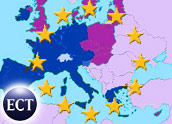
In the latest battle in a fierce war over intellectual property, the European Parliament yesterday rejected software patent legislation that some fear would result in overly broad patents on software ideas. The governing body sent the directive back to the European Commission for review and possible resubmission.
Backers of the measure — which would broaden patent coverage to include software that is central to certain devices, including mobile handsets — contend that without the added protection, investment in research and development would slow and technological progress would suffer.
Opponents of the broader patents, who won a victory in the unanimous Parliament decision this week, claim the opposite — that patents on less tangible technologies and processes would hurt both innovation and interoperability.
Poland’s Patent Stand
Maurice Shenk, a technology attorney with the firm Steptoe & Johnson in the United Kingdom, said European officials are in search of patent legislation that will be somewhat broader but not as broad as that in the United States.
“The U.S. has been the easiest place to get software patents, maybe the only place in some instances,” Shenk told TechNewsWorld. “There’s been an effort to tailor [the European patent directive] more narrowly.”
Although the European Parliament’s decision to send the proposed patent rules back to the European Commission was unanimous, Shenk said that Poland, the biggest of the European body’s 10 new members, lobbied hardest for the move.
“Poland really flexed its muscles,” Shenk said. “It was basically Poland saying it wouldn’t accept the new directive.”
The European patent battle has pitted powerful companies against powerful communities, particularly open-source software advocates, with both sides accusing the other of being a special-interest group.
In order to become law, the patent directive would have to be accepted by the European Parliament as well as the two dozen nations that make up its membership.
Commercialization Cause
Yankee Group senior analyst Laura DiDio said the European patent issue amounted to a “clash of ideologies,” adding that the matter becomes more complex when considering that free and open-source software is currently being commercialized.
“The vocal opponents [to the patent directive] would be fine, if we were not seeing the commercialization of open source, particularly Linux,” DiDio told TechNewsWorld. “When you deploy open source, particularly Linux, in a corporate, commercial environment, open source and Linux will have to conform to the business dictates and needs for commercial enterprises.”
DiDio said patents provided a degree of ownership and responsibility for software. “At least it provides some measure of redress, control and structure,” she said.
She added that overly broad patents, even if issued, can be challenged and rejected.
Challenging Balance
However, Dan Kusnetzky, IDC vice president of system software, believes that fears of broader patent laws are justified.
While patents have historically been applied to processes in manufacturing, hardware design or other “things you can touch,” the European patent directive may have come too close to enabling the patenting of ideas, he said.
“I think when you can patent a thought, it has a tendency to slow down the growth and innovation of industry,” Kusnetzky told TechNewsWorld.
The analyst, who also argued that overly broad patents presented barriers to interoperability, said it appears European Union officials looked at the patent legislation and felt that its intended and unintended consequences demanded further analysis.
“It’s an interesting challenge — allowing vendors who have worked to create something to enjoy the fruits of their labor without preventing others from changing, innovating and improving that idea,” Kusnetzky said.











































